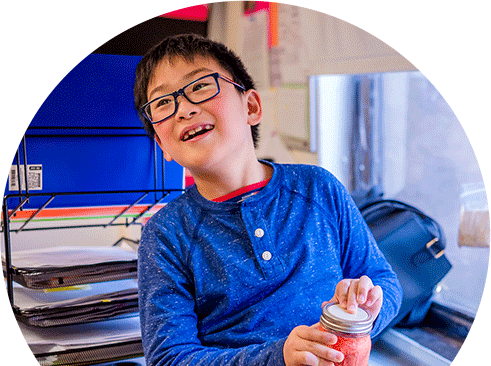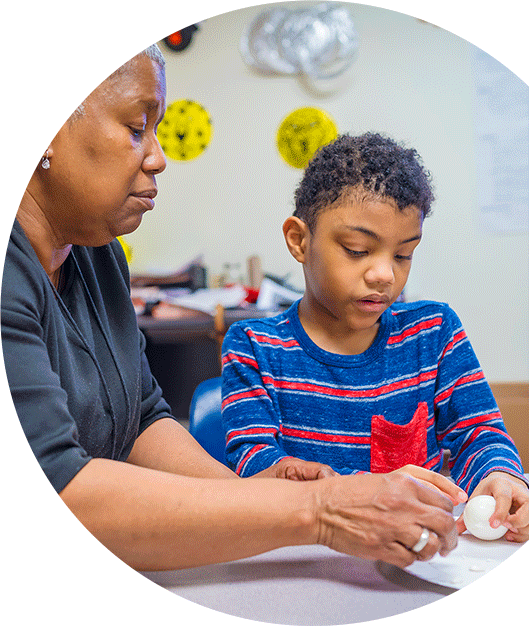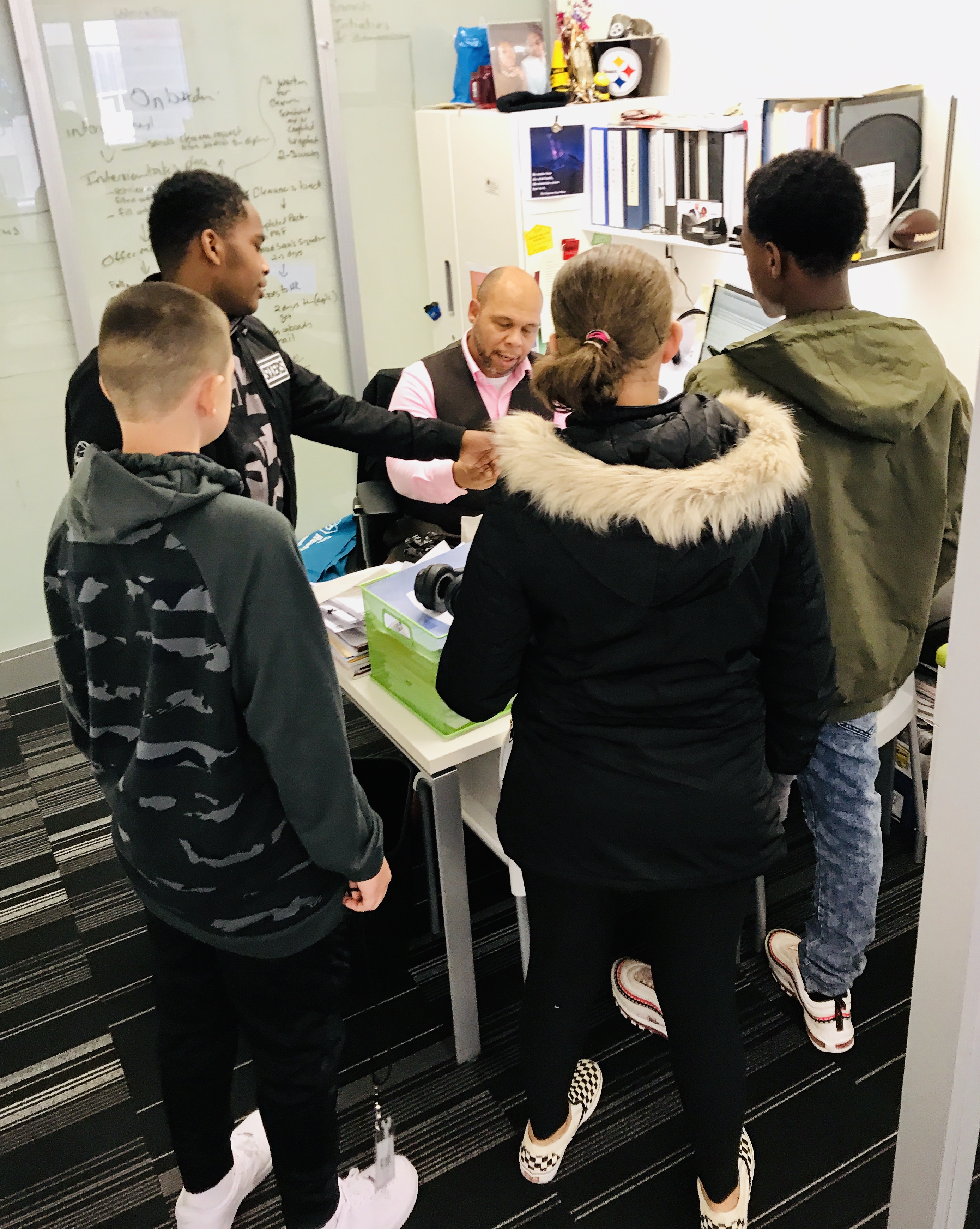As part of our Approved Private School (APS), The Academy provides therapeutic academic and behavioral opportunities for students ages 5 to 21 with severe emotional disturbance, other health impairments (OHI), and behavioral health disorders. Academic instruction includes core academic subjects, reading, and math interventions, life skills coaching, transition coordination, vocational courses, and access to comprehensive therapeutic services. Students enrolled in APS are referred by local school districts and have access to small classroom sizes and plentiful support staff.
The Academy provides trauma-centered education, offering a calm and supportive environment to help students build positive relationships and learn to treat others with dignity and respect. The Academy’s philosophy is that all students can learn and be successful. By focusing on students’ positive behavior, this approach aids learning and success while also holding students accountable.
Within the program, all students have an Individualized Education Program (IEP), implemented by educators and support staff.
The Academy offers a well-rounded and inclusive school experience for all students through field trips and specialty classes such as art, music, physical education, and computer technology. In addition, APS has a school-wide behavior plan focused on three main principles:
Class sizes are limited to a maximum of 12 students and each classroom is equipped with a certified Special Education Teacher and Classroom Assistant. Full-time clinical staff and climate staff are part of our school resources.

Serving students between the ages of 5 and 21 years old, Fairwold Academy SPIRIT (Special People Integrating Real-life with Instruction and Training) offers quality, comprehensive academics to students with a wide range of disabilities and disorders, including Autism spectrum disorder, emotional and behavioral disorders, and intellectual disabilities. All students are taught within a therapeutic framework featuring small class sizes and an array of specialized support services. This approach enhances students’ learning experiences and produces the most positive outcomes. Students receive the emotional and trauma-informed support necessary to thrive academically, emotionally, and socially at Fairwold Academy and within their communities.
SPIRIT maximizes academic potential through an individualized curriculum designed to support students with acute behavioral challenges and low-incidence disabilities with four primary goals:
The SPIRIT program features a low student-to-educator ratio that supports individualized learning with assistive classroom technology – such as iPads, laptops, headphones, and applications – to strengthen communication skills and foster language development for those who cannot speak. This technology is fully integrated into lessons and classroom instruction to address communication, written expression, and sensory needs. All SPIRIT program teachers are Pennsylvania Instructional I or II certified in Special Education.
Students are referred by local school districts and have access to small classroom sizes and plentiful support staff.

Fairwold Academy provides vocational and transitional programs for students to experience the responsibilities of employment. Wide-ranging opportunities are offered through six on-campus programs and partnerships with more than 25 local businesses, and each strives to reinforce a sense of self-worth as students participate in their communities and plan for their future – whether it’s self-sufficiency or college preparation.
Fairwold Academy’s Vocational Program offers secondary transitioning to prepare students for adult life after they graduate from high school through guidance from faculty, staff, and their Individualized Education Plan (IEP) that is offered throughout their academic career. This transition can be thought of as a bridge between school programming and adult life. Planning typically begins at age 14 but can be implemented as early as third grade for some students.
At Fairwold, students complete a vocational evaluation and interview, sharing their career interests. Based on this information gathering, a Transition Portfolio is developed to assist the student in obtaining employment or pursuing higher education. This portfolio is composed of everything from financial aid paperwork to letters of recommendation and references for employment.
Early on, students are introduced to a medley of careers through classroom instruction, assemblies, field trips, internships, and Fairwold’s annual Transition Fair. Through these opportunities, students are able to explore career and educational interests by meeting with employers, military recruiters, technical schools, colleges, and Fairwold alumni. Fairwold Academy’s students have the opportunity to engage with the following industries:
Once students reach 11th grade, they can choose to participate in Fairwold’s workplace mentorship program, which allows students to split their time between the classroom and an off-campus worksite. Each vocational program has an entrepreneurial component and offers students an opportunity to work in their fields of interest. This experience helps students determine future career paths and develop soft skills that will help them thrive as they transition to adulthood.
Fairwold Academy’s Transitional Program is a coordinated set of activities designed to prepare students for life after graduation. Competitive employment and self-sufficiency are the ultimate goals for all students.

The Work Orientation and Readiness Center (WORC) was the brainchild of a group of occupational therapists who observed students working at various off campus sites lacked basic soft skills to be successful in the work environment. WORC is a curriculum based licensed and copyrighted program that provides students opportunities to practice, role play and model interpersonal skills in an authentic work environment on the school campus.
The role of an Occupational Therapist is to help individuals with disabilities engage in meaningful occupations or activities through building functional skills and/or creating adaptations for success in life endeavors. Our mission at Fairwold Academy is to help students develop the necessary interpersonal and soft skills to be successful in future work endeavors and become a contributing member of the community. Through modeling and active teaching, occupational therapists introduce various interpersonal/employability skills while students practice the soft skills and engage in everyday functional work tasks.
Key components of WORC parallel the tenets of 21st century skills and project-based learning; Collaboration, Creativity, Critical thinking and Communication. WORC also supports the Pennsylvania Department of Education’s (PDE) Future Ready Index and Every Student Succeeds Act (ESSA) accountability by providing career awareness and preparation as well as skill development to promote career retention and advancement. A few of the touch-points of the program include; voice volume, body language, task initiation, requesting help, on the job problem solving, coping strategies, and working independently as well as cooperatively with others. Examples of jobs tasks include: laundry service ( sorting, washing, folding, delivering) for vocational classrooms, creating/distributing wildcat bucks and paws, laminating school projects/PBIS reward system incentives, copying papers for teachers, creating shredded bedding for the animals in Animal Assisted Intervention, delivering staff mail, assembling new student information packets, stamping outgoing school mail, creating crafts for school store/events, and data entry.
The magic of WORC is that students are highly motivated to participate in authentic work tasks across campus and don’t realize the valuable interpersonal skills they are acquiring while in the flow. Self esteem, confidence and a sense of purpose grow exponentially while students are engaged at WORC. This platform acts as a springboard for students to gain essential transferable jobs skills in a safe environment.

The Animal Assisted Therapy (AAT) and Nature Education Program at Fairwold offers Animal Assisted Interventions (AA/I) to students who attend Fairwold’s SPIRIT and Approved Private School.
Caring for and showing kindness to animals helps students learn empathy, understanding, and other social skills while also helping to develop a sense of responsibility. By fostering positive relationships between children and nature, students are encouraged to grow into adults with an understanding of the integral part animals and nature play in the world.
Animal Assisted Education (AAE) augments traditional school subjects, introducing students to the commonalities shared by all living things. Animals can facilitate lessons in science, math, reading, humane education, and responsibility as well as help build social skills.
Animal Assisted Education (AAE) augments traditional school subjects, introducing students to the commonalities shared by all living things. Animals can facilitate lessons in science, math, reading, humane education, and responsibility as well as help build social skills.
Animal Assisted Interventions (AA/I) are geared toward social interactions, self-esteem enhancement, gross/fine motor skill development, and quality of life enhancing processes. The program is a scheduled, goal-directed intervention designed to improve cognitive and physical functioning, with both short and long-term goals in which the animal aids students in meeting specific criteria as part of the treatment process. The sessions may be conducted in groups or individually depending on a student’s individualized needs. AA/I can be a one-time session or an ongoing part of a student’s curriculum.
All of the animals involved in the Animal Assisted Therapy and Nature Education program are cared for in accordance with both local and national Animal Rights and Welfare Laws. Specifics about these and other daily practices of the AAT program can be found in the Operational Guidelines manual for the program.